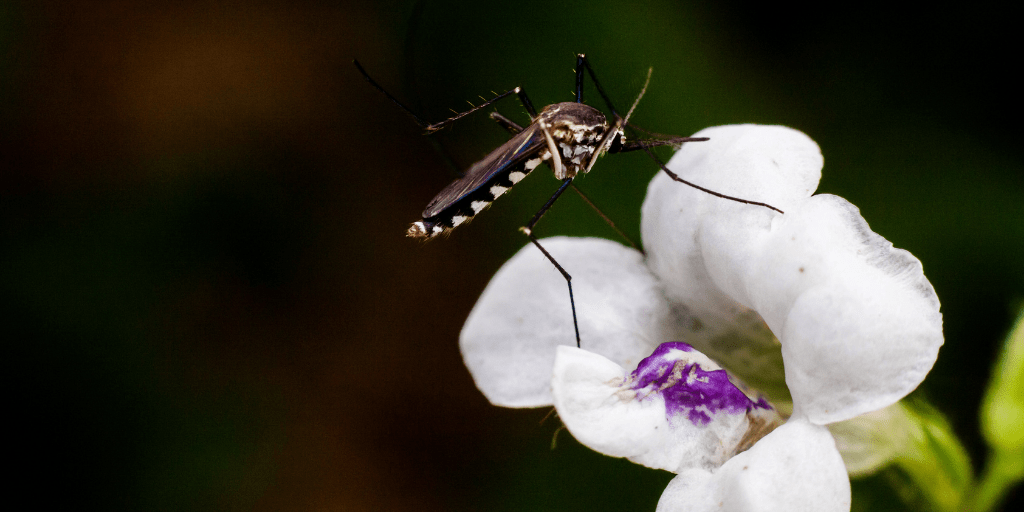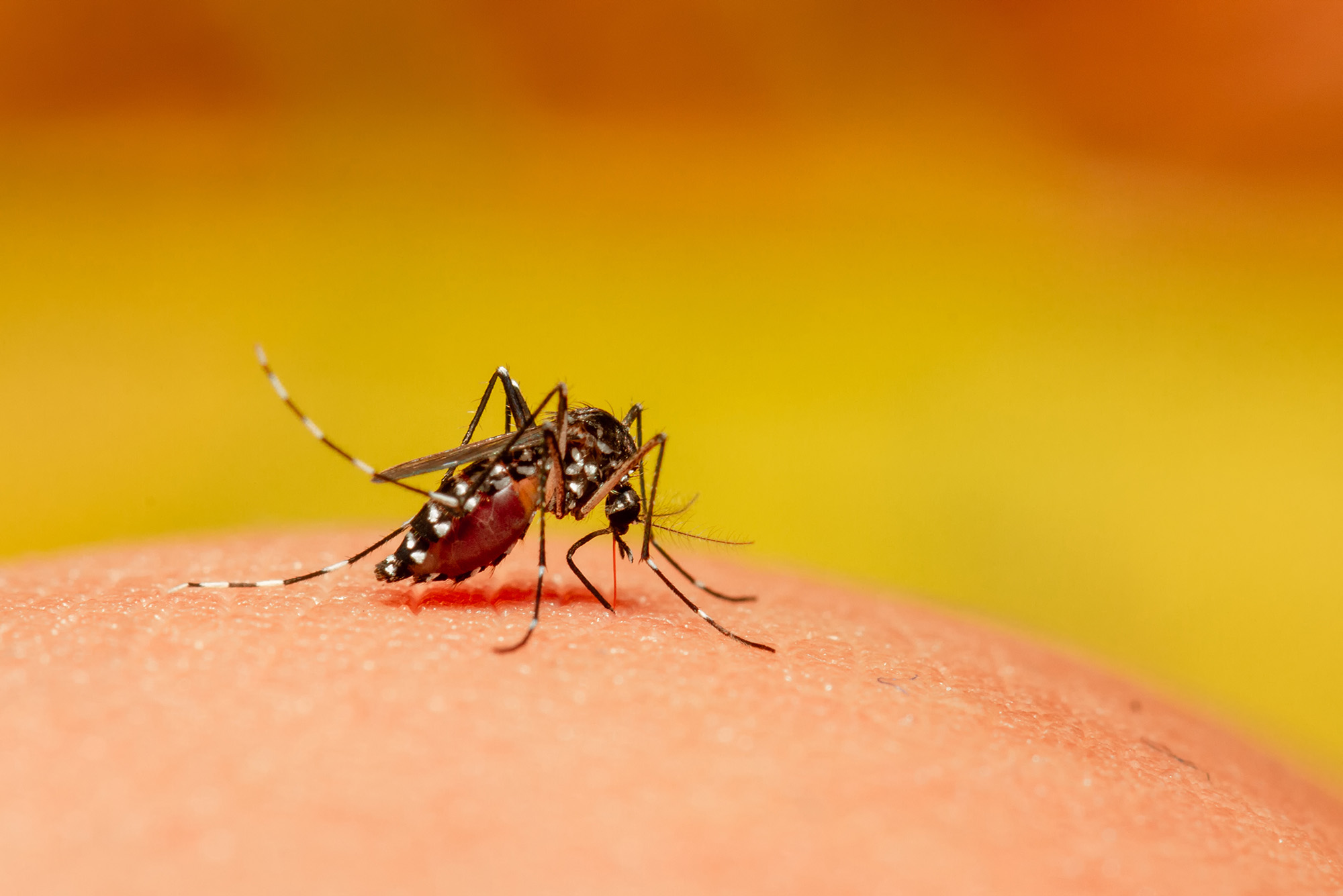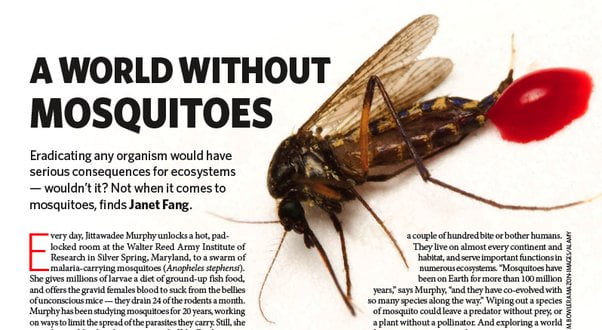Mosquitoes do have a beneficial role in the ecosystem as they serve as a food source for various wildlife, including birds, bats, and fish. Additionally, some species of mosquitoes act as pollinators, contributing to plant reproduction.
Despite being a nuisance to humans, mosquitoes play a crucial part in maintaining the balance of the ecosystem by providing sustenance for other organisms. If mosquitoes were to disappear, it would disrupt the food chain and have a cascading effect on various animal populations that rely on them for sustenance.
Understanding the importance of mosquitoes in the ecosystem sheds light on their significance beyond being mere pests.
Mosquitoes: Pests Or Pollinators?
Mosquitoes: Pests or Pollinators?
Role In Pollination
Mosquitoes play a surprising role in pollination, serving as important pollinators for various plant species.
Nectar-feeding Behavior
Male mosquitoes have a nectar-feeding behavior, where they feed on nectar from flowers, inadvertently pollinating plants in the process.

Credit: blog.nwf.org
The Food Chain: Mosquitoes As A Link
Mosquitoes, often seen as pesky blood-suckers, actually play a crucial role in the ecosystem as a link in the food chain. These tiny insects serve as a vital food source for a variety of creatures, both in their aquatic larvae and adult forms.
Aquatic Larvae As Prey
Mosquito larvae, dwelling in water bodies, serve as a nutritious meal for numerous aquatic predators. Fish, amphibians, and even some insects rely on mosquito larvae as a primary food source. This sustains the populations of these predators, contributing to the overall biodiversity of aquatic ecosystems.
Adult Mosquitoes In Diets Of Predators
Adult mosquitoes, while notorious for their bites, also form an essential part of the diet for various predators. Birds, bats, and other insects depend on adult mosquitoes as a significant protein source, helping to sustain their populations and contributing to the intricate balance of the ecosystem.
Biodiversity And Mosquitoes
Mosquitoes may seem like a nuisance, but they do serve a purpose in the ecosystem. They act as a food source for various wildlife and also play a role in pollination. Despite their negative impact on humans, mosquitoes do have some beneficial aspects in the natural world.
When it comes to biodiversity, mosquitoes may not be the first creatures that come to mind. However, these tiny insects actually play a significant role in supporting diverse ecosystems. From their interactions with microorganisms to serving as a vital food source for other wildlife, mosquitoes contribute to the delicate balance of nature.
Supporting Diverse Ecosystems
Mosquitoes, although often seen as pests, are an integral part of the food web. They serve as important prey for various animals, both in their winged adult form and as aquatic larvae. Predators such as dragonflies, turtles, bats, and birds, including hummingbirds, rely on mosquitoes as a primary food source. These small flying insects provide essential sustenance, ensuring the survival of numerous species.
In addition to being a crucial food source, mosquitoes also play a role in pollination. While they may not be as effective as bees or butterflies, certain mosquito species contribute to the pollination process by transferring pollen between plants as they feed on nectar. This interaction helps maintain plant diversity and supports the overall health of ecosystems.
Microbes And Mosquito Interactions
Mosquitoes have intricate interactions with microorganisms that further highlight their importance in biodiversity. These interactions occur both internally, within the mosquito’s body, and externally, in their surrounding environment.
Inside their bodies, mosquitoes harbor various microbial communities. These microbes can have significant impacts on mosquito biology, including their ability to transmit diseases. Scientists are studying these interactions to gain a better understanding of mosquito-borne illnesses and develop effective control strategies.
Externally, mosquitoes also interact with microorganisms present in their habitats. For example, the larvae of some mosquito species feed on microorganisms in stagnant water bodies. This feeding behavior not only affects the mosquito’s development but also influences the overall microbial diversity in these ecosystems.
By studying the intricate relationships between mosquitoes and microorganisms, researchers can gain insights into the ecological roles of these insects and their potential impacts on human health.
In conclusion, while mosquitoes may be perceived as annoying pests, they play a vital role in supporting biodiversity. From serving as a food source for various predators to their interactions with microorganisms, mosquitoes contribute to the delicate balance of ecosystems. Understanding and appreciating the role of mosquitoes in biodiversity can help us develop sustainable strategies for coexistence and conservation.

Credit: www.britannica.com
Mosquitoes In Scientific Research
Mosquitoes play a crucial role in scientific research, contributing to various areas of study that have broad implications for human health and well-being. Their unique genetic makeup and interactions with disease-causing pathogens have made them invaluable subjects in genetic studies and disease research.
Genetic Studies
Mosquitoes have been instrumental in genetic studies due to their rapid reproduction and well-characterized genome. Scientists have utilized mosquitoes to investigate genetic traits, gene expression, and gene editing techniques, providing valuable insights into fundamental biological processes.
Disease Research Contributions
Mosquitoes have significantly contributed to disease research by serving as vectors for various pathogens, including malaria, dengue fever, and Zika virus. Their role in transmitting these diseases has enabled researchers to study the mechanisms of pathogen transmission, host-pathogen interactions, and the development of potential vaccines and treatments.
Environmental Impact Of Mosquito Control
Mosquitoes, despite being a nuisance to humans, do serve some beneficial purposes in the environment. They act as an important food source for various wildlife, including birds, bats, and frogs, and they also play a role as pollinators for certain plants.
However, it is important to balance their benefits with the need for effective mosquito control to prevent the spread of diseases.
Mosquito control measures are often implemented to reduce the population of these pesky insects and mitigate the spread of diseases they carry. However, it is crucial to consider the environmental impact of such control methods. These methods can have unintended consequences on non-target species and may lead to long-term ecological changes.Effects On Non-target Species
When implementing mosquito control measures, it is essential to consider the potential effects on non-target species. Some common methods, such as spraying insecticides, can unintentionally harm other insects, including beneficial pollinators like bees and butterflies. These insecticides can disrupt the delicate balance of ecosystems, leading to a decline in biodiversity.Additionally, insecticides used for mosquito control can also impact aquatic organisms. The chemicals may accumulate in water bodies, affecting fish, amphibians, and other aquatic life. These non-target species play vital roles in maintaining the ecosystem’s health, such as controlling pest populations and contributing to nutrient cycling.Long-term Ecological Consequences
While mosquito control measures may provide short-term relief from the nuisance and diseases associated with mosquitoes, they can have long-term ecological consequences. For example, reducing the mosquito population may disrupt the food chain, as mosquitoes serve as a significant food source for various animals, including birds, bats, and fish.When the population of mosquitoes declines significantly, it can negatively impact the predators that rely on them for sustenance. This disruption can cascade through the ecosystem, affecting the abundance and distribution of other species. Over time, it may lead to imbalances and potentially harm the overall ecosystem health.It is crucial to approach mosquito control strategies with an understanding of the potential environmental impact they may have. Implementing alternative methods that minimize harm to non-target species and employing integrated pest management practices can help strike a balance between mosquito control and maintaining a healthy ecosystem.In conclusion, while mosquito control is necessary for human health and well-being, it is essential to consider the environmental impact of these measures. Understanding the effects on non-target species and potential long-term ecological consequences can guide us in implementing effective and sustainable mosquito control strategies. By prioritizing both human and environmental well-being, we can strike a balance that ensures a safer and healthier world for all.Cultural And Economic Significance
Mosquitoes have a significant impact on both culture and the economy. Despite being notorious for their itchy bites and role in spreading diseases, mosquitoes have a surprising cultural and economic significance.
Mosquitoes In Literature And Folklore
Mosquitoes have found their way into the literature and folklore of many cultures, often symbolizing annoyance and pestilence. In literature, they are frequently used as metaphors for persistence or irritation, reflecting their pervasive presence in daily life.
Impact On Outdoor Industries
Mosquitoes can have a substantial impact on outdoor industries such as tourism, camping, and outdoor events. Their presence can deter visitors and reduce the overall enjoyment of outdoor activities, leading to economic repercussions for businesses and local economies.
Potential Medicinal Benefits
Mosquitoes may have potential medicinal benefits, but they are not beneficial in the traditional sense. They serve as a food source for other wildlife and also play a role in pollination, contributing to the ecosystem’s balance. However, their negative impact on humans and animals outweighs any potential benefits.
Mosquitoes are often regarded as pests because of the diseases they transmit. However, recent studies have shown that mosquitoes also have potential medicinal benefits. Mosquito saliva contains a variety of compounds that have been found to have anticoagulant and anti-inflammatory properties.Anticoagulant Properties Of Saliva
One of the components of mosquito saliva is an anticoagulant called apyrase. Apyrase helps prevent blood clotting, which allows mosquitoes to feed on blood more efficiently. This same property has led to research on using apyrase as an anticoagulant medication in humans. A study conducted by the University of California found that apyrase helped prevent blood clots in rats, suggesting it could have similar effects in humans.Research In Anti-inflammatory Agents
Mosquito saliva also contains anti-inflammatory compounds that have been found to reduce swelling and pain. A study conducted by the National Institute of Allergy and Infectious Diseases found that a protein in mosquito saliva, known as D7, had anti-inflammatory properties. Researchers are currently exploring the potential use of D7 as a treatment for inflammatory disorders such as rheumatoid arthritis.In conclusion, while mosquitoes are mainly known for their harmful effects, they also have potential medicinal benefits. Research into the anticoagulant and anti-inflammatory properties of mosquito saliva has shown promising results, and scientists are continuing to explore the possibilities of using these compounds in medication.
Credit: www.bu.edu
Challenges In Mosquito Management
Mosquitoes, despite their nuisance to humans, do serve some beneficial purposes in the ecosystem. They act as an important food source for various animals, including fish, birds, and bats. Additionally, certain mosquito species play a role in pollination. However, the negative impacts they have on human health outweigh these benefits, making effective mosquito management essential.
Balancing Control And Conservation
Mosquitoes can be a nuisance and a health hazard, but they also play an important role in the ecosystem. As a result, mosquito management can be a challenging task. It’s important to balance the need for control with conservation efforts to ensure that we don’t upset the delicate balance of nature.Emerging Strategies In Mosquito Control
Traditionally, mosquito control has focused on the use of insecticides and larvicides. While these methods can be effective, they also have the potential to harm non-target species and contribute to the development of resistance. As a result, researchers are exploring new strategies for controlling mosquitoes. One promising approach is the use of genetically modified mosquitoes that are incapable of transmitting diseases. Another strategy involves the use of bacteria that can reduce mosquito populations by interfering with their ability to reproduce.In addition to these emerging strategies, it’s important to consider the broader context of mosquito control. For example, land-use practices can have a significant impact on mosquito populations. By reducing standing water and preserving wetlands, we can create a less favorable habitat for mosquitoes and reduce the need for insecticides.Overall, mosquito management is a complex issue that requires a multifaceted approach. By balancing control and conservation and exploring new strategies for mosquito control, we can protect public health while also preserving the natural world.Frequently Asked Questions
Are There Any Benefits To Mosquitoes?
Mosquitoes serve as an essential food source for various wildlife and aid in pollination, contributing to the ecosystem’s balance.
What If Mosquitoes Went Extinct?
If mosquitoes went extinct, it would disrupt ecosystems as they serve as food for many animals.
Could We Live Without Mosquitoes?
Living without mosquitoes is possible, but they serve as crucial food sources for various wildlife.
Conclusion
While mosquitoes may seem like nothing but a nuisance to humans, they do serve a purpose in the ecosystem. As important prey for a variety of wildlife, including birds, bats, and frogs, they play a role in the food web.
Additionally, some mosquito species are important pollinators. However, this does not negate the fact that they also spread dangerous diseases and can cause harm to human health. It’s important to find a balance between preserving their ecological role and controlling their populations to protect human health.
Related posts:

I’m MD Tanvir, and I bring years of expertise gained from working closely with pest control companies to the forefront. My journey in the industry has inspired me to launch Bug Battler, a platform aimed at equipping people with the know-how to combat pests autonomously. Through Bug Battler, I aim to empower individuals with practical insights to tackle pest infestations effectively.

